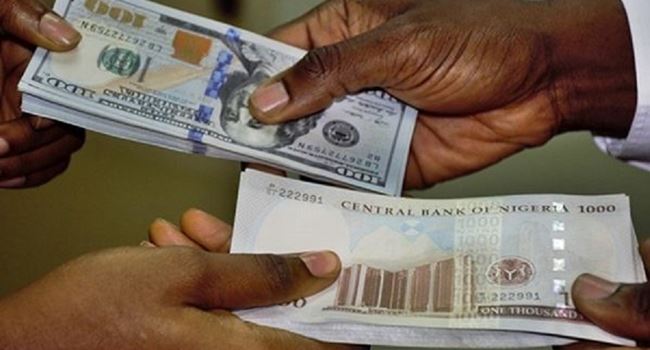The naira continued to decline against the US dollar yesterday, falling to an all-time low on the black market where it was sold for N1100 to $1, which was lower than the N1,060 to $1 it traded for the day before. For individuals who need wire transfers, the national currency traded at N1,130 to $1.
According to statistics from the Central Bank of Nigeria, the country’s currency sold for N883.56/$ yesterday as opposed to N775.44/$ the day before on the official Investors and Exporters’ (I&E) window.
The Central Bank of Nigeria (CBN) recently announced the lifting of import restrictions on 43 products, which was ascribed to the naira’s devaluation as a result of ongoing dollar shortages in the banking system and increased demand.
Additionally, according to information from the FMDQ, the overall daily volume turnover on the official I&E window yesterday was $69.88 million, a severe decrease of 48.04 percent from the $134.28 million registered the day before.
As of yesterday, there were greater prospects for market arbitrage as the difference between the parallel market and the I& E FX Window grew to N216.44 to a dollar.
Analysts have noted that the move provides more naira to government officials, particularly state governors, and may encourage some of the governors to engage in irresponsible expenditure.
“We may see some state governors who in the coming days because of the excess naira they would get from federation allocation indulge in reckless spending,” the analyst who pleaded to remain anonymous added.
Meanwhile, the highest spot rate observed during the day, according to the FMDQ, was N986/$1, while the lowest spot rate was N701/$1.
Last week, the CBN Governor, Mr. Olayemi Cardoso, emphasised that the apex bank does not have a magic wand to address the myriad of challenges facing the Nigerian economy.
“It must be emphasised that CBN does not have a magic wand that can be waved at the current economic challenges.
“The problems facing the bank are large and complex. However, with focused leadership and sustained reforms, it is expected that over time, the country will gain open economic spaces, attract new investments, create employment, and give our hardworking and talented compatriots an opportunity for a more prosperous future,” he had explained.
Cardoso stated that the ability of the central bank to help the fiscal authorities in achieving a $1 trillion GDP within eight years, moderate inflation, increase foreign reserves, and swiftly recover from economic downturns are among its primary objectives.
Additionally, the CBN said last week that importers of 43 goods who had previously been prohibited from obtaining foreign currency (FX) in the official window may now do so going ahead.
The eight-year prohibition on the 43 key products that were prohibited from obtaining dollars on the official market was lifted, and the central bank had said that it would periodically participate in the foreign exchange market to increase liquidity.
It was expected that the move would help stabilise the naira exchange rate. The apex bank in June 2015, had initially included 41 items to the list of commodities which were not-valid to purchase FX from the market, citing the need to conserve the scarce forex and encourage domestic production for self-sufficiency and exports. The list was thereafter expanded to 43 items.Some of the items listed then as not-fit-for forex included rice, cement, margarine, palm kernel products and vegetable oil, meat and processed meat products, vegetables and processed vegetable products, poultry chicken, private airplanes, tinned fish in sauce, roofing sheets wheelbarrows, head pans, among others.
However, in last week’s statement, the CBN Director, Corporate Communications, Dr. Isa AbdulMumin, had said the central bank would continue to promote orderliness and professional conduct by all participants in the FX market segment to ensure that market forces determine exchange rates on a Willing Buyer – Willing Seller principle.













